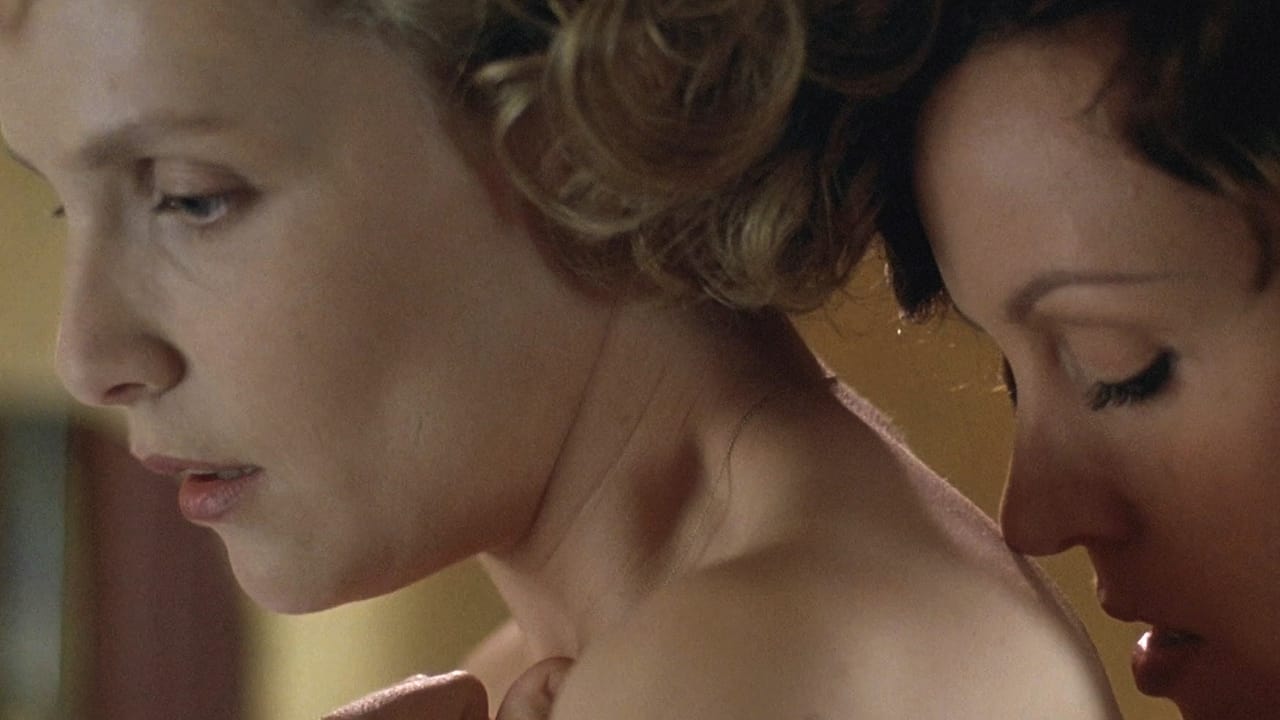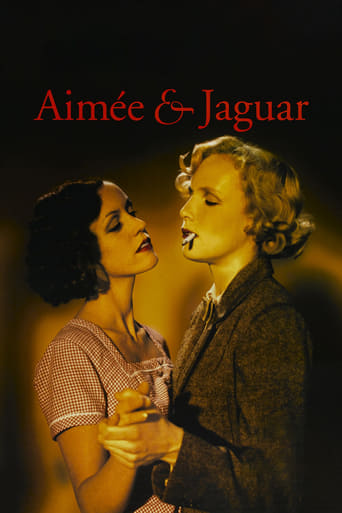Cathardincu
Surprisingly incoherent and boring
Kailansorac
Clever, believable, and super fun to watch. It totally has replay value.
TaryBiggBall
It was OK. I don't see why everyone loves it so much. It wasn't very smart or deep or well-directed.
Tyreece Hulme
One of the best movies of the year! Incredible from the beginning to the end.
Danusha_Goska Save Send Delete
"Aimee and Jaguar" depicts a Lesbian Jew living in WW II Germany who falls in love with an ostensibly straight Nazi. What an exciting premise! I was so let down. There was all this capital S !Stuff! up on the screen that I was supposed to have been moved by. I was less moved while watching this histrionic opera than while watching many a low-key documentary. An example: the scene where Lilly, the German Nazi, and Felice, the Jewish Lesbian, first make love. Lilly kept shaking. She's very pale (Aryan, doncha know). And watching her shake and shake and shake and shake in a way meant to be erotic, and watching her pale, waxy skin, all I kept thinking was, "Geez, she looks like someone in the final phase of malaria." There were naked and shadowed unmentionable gynecological bits in that scene, and lots of highly charged social/erotic elements, and it carried zero erotic charge, for me. The movie was too long. It added a pre-plot intro and a post-plot coda that offered nothing. Scenes went on too long. I found myself counting the breaths between lines, the number of times people repeated the same sentence over and over. The movie works to make Lilly a slob and a hoyden. Lilly meets one of her lovers while wearing stockings and wool socks and a sloppy slip – but the movie makes the point that even homeless Jewish Lesbians can look soignee in wartime Berlin. Lilly yells at her kids; she sleeps around. She isn't very bright. She isn't especially pretty, either. Okay, so ... why did Felice risk her life to connect with this Nazi? Just for her blonde, Aryan locks? For the cheap thrill? No, the movie wants this to be a BIG love story, a Scarlett and Rhett of Nazism. Um, nope. The movie works really hard not to let the viewer know exactly what's going on. I didn't find this thrilling. I didn't feel, "Gee, I'd better figure this out fast," I found it boring and alienating. I didn't feel that underneath the movie's surface confusion and incomprehensibility – "Why is she pushing her away? Who is this character? Why doesn't he suspect Felice's true identity?" – that there was a comprehensible and full world I just needed to get to know. Rather, I felt that the movie's incomprehensibility was a sloppy, amateurish effort to be casual, while not really creating a coherent world. I just found it to be a very amateurish, utterly cold, badly put together movie. and that is such a shame. This could have been big. I can't help but think of – go ahead, hate me – Steven Spielberg. Spielberg knows how to use a camera to communicate humanity, while handling similarly huge, titillating themes against big historical backdrops. The brief scene in which Robert Shaw in "Jaws" talks about the sinking of the USS Indianapolis, or Tom Hanks talking about being a teacher in "Saving Private Ryan" convey more humanity than Lilly does during the entire movie. "Aimee and Jaguar" is full of scenes of Aktors Akting as if they are Brave or full of Joi de Vivre or Deeply In Love but I didn't see a single human being brave or expressing joi de vivre or loving. There was one scene of "Aimee and Jaguar" that worked wonderfully for me. A Jewish Lesbian has been homeless and hungry. She goes to a Nazi club and begins to wash her undies out in the sink of the Ladies' Room, while complaining about sleeping in public buildings. A Nazi matron comes in and, contemptuously, sells ration coupons to the Jewish woman. The Nazi matron only saw the Jew to the extent that she could profit by selling a coupla ration coupons. Nazi Germany does have its parallels to contemporary life.
kino1969
I read the biography FIRST, which, in itself, was decent (but not great). I was hoping that, in a 2+ hour movie, most of what was in the Erica Fischer's book would be in the movie, but there was quite a bit missing (especially the story of Lily and Felice AFTER Felice is taken to Theresienstadt, which took up the 2nd half of that book). I will give the makers of the movie the benefit of the doubt that they were probably working on a small budget and there may have been restrictions with filming in certain places at the time.------ The first half of the movie seems to be all over the place, with no real chronological series of events (the book is chronological, but wavers between the Nazi threat and the love between 2 women). After viewing the movie, and having read the book FIRST, I have come to the conclusion that the first part of the movie was erroneously edited backwards in chronological order (especially how they first met until they became lovers). However, there are 3 inexcusable problems with the movie: 1) It doesn't quite know how it wants to portray Felicity, whether as part of the communist underground (which is hardly touched upon with any accuracy).- I'm sure viewers wonder "who and what is Fritz or those other 3 women?"-, whether it wants to be about the taboo subject of lesbianism in Germany at the time, or if it wants to go off on Felicity's Jewish background (which is her downfall, although the loose communism subplot leads up to her downfall, but quickly changes to her Jewish background). 2) The character of Gunther is made to be a mean SOB, but Lily is made to be a subordinate little German housewife whose strength and dignity only ignites when she is mad at Felicity (who in the book is described as usually wearing long pants instead of skirts, and she wears skirts 95% of the time in the movie!). Yes, Gunther was a SOB, but Lily (as she comes across in the book) is just as bad (even though Ms. Fischer attempts to give her a victim-like persona with her writing). They were in a loveless marriage and Gunther had a mistress, but to have Gunther be the total baddie is unfair, seeing that Lily also committed adultery, and both knew about each others' lovers and preferences. Also, Lily, as it written in the book (intentional or not) never really comes across a great mother, but I doubt that after the lesbian "orgy" in a main scene in the movie that the women would be sleeping in the children's bedroom! 3) The Lily versus Inge story. It flickers 2x in the movie (at the very beginning and 1/2 way through the movie), but culminates at the end (in the "present" when they meet again). I didn't read a sub story in the book to this huge rift between them over Felice, neither did I recognize that they vied over her endlessly. I believe the makers took liberty with the book to give another level to the many antagonistic atmospheres throughout the movie. It's an unnecessary story. Also, it is not altogether clear whose story this is, whether it is Lily's or Ilse's or someone else's.----- Overall, as a person who truly enjoys movies set in Nazi Germany dealing with the many groups that were censured and ultimately murdered (Jews, gays, communists and other political "criminals," & even Russians), I am rather troubled by the overly simplistic way that several of these groups are (or maybe how they are "not") portrayed. I know it's a love story about forbidden love, but, in the end, it feels (to me) like a travesty in the memory of Felicity (and Lily, to a point) that such glaring omissions and inaccuracies are in the movie.----- The book, although problematic in its writing, is a much better source on the subject of Lily, Felice, and all of the other people that makes this story interesting. Overall, I would like to see a better movie made (and not by a TV director, which is always a problem to me). It is a great subject, with only "Bent" being the other well known movie (off the top of my head) about homosexuality and Nazi persecution.----- I do give a nod to the director for the pond scene near the end and the capture the same day of Felicity, which is not only noted in the book, but the re-creation is very well done. The actual photographs that were taken on the camera timer are in the book and on the cover of the book.-----Too much melodrama, and not enough respect for a true story or for history. Unfortunately, few movies have been made on the subject of homosexuality and Nazi victims.-----E.
writers_reign
There's a great new Billy Wilder movie out with all the hallmarks of Wilder at his blackest/drollest: Berlin, 1943/44. Lilly's husband is somewhere on the Eastern Front leaving her free to 'entertain' a succession of gentlemen callers in the afternoons and using the cash she makes to buy things for her four children. Somehow, though, that 'ol' upper-case Love keeps eluding her. Maybe she'll find it in the arms of Felice; by day an intrepid reporter, by night an activist in the underground - as in Resistance as opposed to U-bahn. Oh, yes, in a typical Wilder twist Felice is also slightly Jewish. There's only one problem. Billy Wilder has gone to the big sound stage in the sky and Max Faberbock wouldn't make even Clapper-Loader on a Wilder set. I'm aware of the glowing notices on this very board but somehow I can't share them. Where they see fantastic acting I see competent; where they see brilliant period detail I see cardboard cut outs. Maybe I'm hard to please.Yes, come to think of it I AM.
Claudio Carvalho
In Berlin, along the Second World War, Felice Schragenheim (Maria Schrader) is a bright Jewish lesbian working in a Nazi newspaper under a false identity and being member of a resistance organization. Lilly Wust (Juliane Köhler) is a woman married with the soldier Günther Wust (Detlev Buck), who is fighting in the German front. Lilly is mother of four children and has never found love, being unfaithful to her husband. Felice meets Lilly and they fall in love for each other, adopting the nickname of Jaguar (Felice) and Aimée (Lilly), jeopardizing the safety of Felicia. This true unconventional and sensitive love story, in a sad period of German history, is a wonderful movie. The reconstitution of the Berlin in the war period is amazing. The performance of the cast is stunning, and the direction is outstanding. Although dealing with lesbian love, this powerful, unforgettable and touching romance is one of the most beautiful film I have recently seen. My vote is nine.Title (Brazil): 'Aimée & Jaguar'

